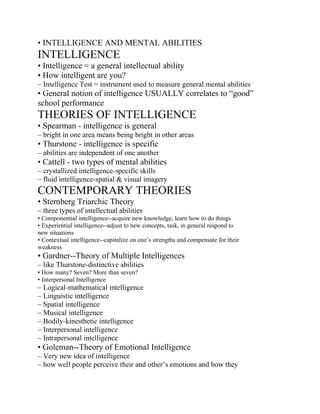
Measuring and Theories of Intelligence
- 1. • INTELLIGENCE AND MENTAL ABILITIES INTELLIGENCE • Intelligence = a general intellectual ability • How intelligent are you? – Intelligence Test = instrument used to measure general mental abilities • General notion of intelligence USUALLY correlates to “good” school performance THEORIES OF INTELLIGENCE • Spearman - intelligence is general – bright in one area means being bright in other areas • Thurstone - intelligence is specific – abilities are independent of one another • Cattell - two types of mental abilities – crystallized intelligence-specific skills – fluid intelligence-spatial & visual imagery CONTEMPORARY THEORIES • Sternberg Triarchic Theory – three types of intellectual abilities • Componential intelligence--acquire new knowledge, learn how to do things • Experiential intelligence--adjust to new concepts, task, in general respond to new situations • Contextual intelligence--capitalize on one’s strengths and compensate for their weakness • Gardner--Theory of Multiple Intelligences – like Thurstone-distinctive abilities • How many? Seven? More than seven? • Interpersonal Intelligence – Logical-mathematical intelligence – Linguistic intelligence – Spatial intelligence – Musical intelligence – Bodily-kinesthetic intelligence – Interpersonal intelligence – Intrapersonal intelligence • Goleman--Theory of Emotional Intelligence – Very new idea of intelligence – how well people perceive their and other’s emotions and how they
- 2. manage their emotions • Five Traits of emotional intelligence – Knowing one’s own emotions – Managing one’s emotions – Using emotions to motivate self – Recognizing the emotions of other people – Managing relationships INTELLIGENCE TEST • Alfred Binet & Theodore Simon--1905 – Binet-Simon Scale • 30 test arranged in order of increasing difficulty • Intelligence Quotient (IQ)--IQ = MA/CA X 100 • Many revisions – individualized test – used most effectively on children – 15 different sub-test; each arranged in ascending order of difficulty • David Wechsler-Wechsler Adult Intelligence Scale (WAIS-III) – Individual Test – First developed in 1939-Wechsler-Bellevue • WAIS-III – Divided into two parts • Verbal skills & performance skills • provides an overall score and scores for verbal & performance sub-scales • Each sub-scale provides level of performance • Wechsler Intelligence Scale for Children (WISC-III) – organized in same fashion as WAIS Individual vs. Group Test • Individual Test: – one on one test setting – takes trained examiner • Group Test: – one examiner - many participants – no “trained” examiner – reduce bias on part of examiner CULTURE-FAIR TEST • Performance Test -- minimize or eliminate use of words • Culture-Fair Test -- eliminate the effect of culture on test taking
- 3. – Cattell’s Culture-fair Intelligence Test GOOD TEST • Reliability – consistency, can the instrument produce similar results over time/administrations • Validity – does the instrument measure what it is intended to measure • These two concepts measured by correlation coefficients Criticisms of IQ Test • Content - what is included in IQ test • Good test takers • Test administration • Unfair to minorities • Language and language usage • Time issue • Limited mental abilities tested IQ & SUCCESS • IQ test scores related to success in school • Higher IQ - higher status occupations • IQ & High Grades in College - little relationship to occupational success--now being challenged • Is IQ the same as intelligence? Determinates of Inelligence • Heredity – Tyron-behavioral genetics • maze bright and maze dull rats – Twin Studies • Environment – How environment, culture, family, education influence IQ performance HUMAN DIVERSITY • Gender – restricted to specific cognitive skills--appear to be decreasing • differences in socialization & expectations • Culture
- 4. – differences in cultural expectations – differences in educational processes:teachers, instructional systems & student expectations EXTREMES OF INTELLIGENCE • Mental Retardation – scores below 70 on IQ test • mild (50s to 70) • moderate (mid 30s to low 50s) • severe (low 20s to mid 30s) • profound (below 20 or 25) • Giftedness – top 2% of population